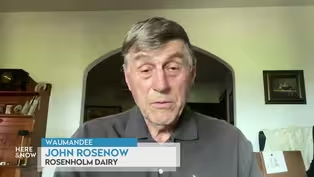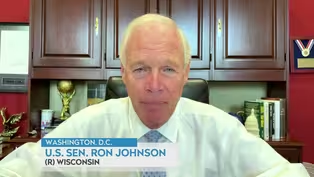Here and Now
Tariffs, Trade War and Woes for Wisconsin's Soybean Farmers
Clip: Season 2400 Episode 2413 | 5m 55sVideo has Closed Captions
Wisconsin soybean farmers are enjoying a bumper crop but are in the middle of a trade war.
Wisconsin soybean farmers are enjoying a bumper crop, but are caught in the middle of a trade war with Trump administration tariffs on China and shifting global markets that are seeing sliding prices.
Problems playing video? | Closed Captioning Feedback
Problems playing video? | Closed Captioning Feedback
Here and Now is a local public television program presented by PBS Wisconsin
Here and Now
Tariffs, Trade War and Woes for Wisconsin's Soybean Farmers
Clip: Season 2400 Episode 2413 | 5m 55sVideo has Closed Captions
Wisconsin soybean farmers are enjoying a bumper crop, but are caught in the middle of a trade war with Trump administration tariffs on China and shifting global markets that are seeing sliding prices.
Problems playing video? | Closed Captioning Feedback
How to Watch Here and Now
Here and Now is available to stream on pbs.org and the free PBS App, available on iPhone, Apple TV, Android TV, Android smartphones, Amazon Fire TV, Amazon Fire Tablet, Roku, Samsung Smart TV, and Vizio.
Providing Support for PBS.org
Learn Moreabout PBS online sponsorshipwith Democrats to do right by the American people.
In agriculture.
Market news, soybeans are trading at $10.26 a bushel today, according to Wisconsin farmers.
At that price, they're losing money.
Here and now, senior political reporter Zac Schultz tells us this is the fallout from the Trump administration's tariffs on China, putting Wisconsin farmers in the middle of an international trade war.
>> Combines are rolling all across Wisconsin, bringing in what looks to be a good soybean harvest.
>> I think it's going to be a real good year for us on our yields.
of the Wisconsin Soybean Association.
Along with his brothers.
He farms 4200 acres of corn and soybeans in Rock County.
And while his bushels per acre look good, the price per bushel has crashed over the last two years.
>> The prices that were being offered right now aren't covering the cost that it costs us to put it in the ground.
>> The decline in soybean markets started last year, but it bottomed out this spring after Donald Trump announced tariffs on China, and China retaliated by refusing to buy U.S.
soybeans.
>> Historically, China has bought more soybeans from the US than the rest of the world combined.
And so when China doesn't buy from us, that's a huge impact to us.
>> Reboots semi holds a thousand bushels of beans, and the minute he drives it off the field, those beans have now entered the international market, competing with growers in Argentina and Brazil.
>> They're growing more and more soybeans every year.
They're clearing able to provide that to China.
marketplace.
Our beans are cheaper than Brazil's.
So in the absence of tariffs, we're ultra competitive.
>> Andy Benson farms 3800 acres in Barron County.
He says most farmers don't have capacity to store soybeans on the farm and have few options in this environment.
>> Those farmers are going to harvest the beans.
They're going to load them in the truck.
If they have a bin, they're going to put them in.
If they don't, they're going to take them to the elevator.
And when they get to the elevator, they have a couple choices.
Take what's offered or put them in the commercial storage and begin to pay a storage premium, which is so much a month.
>> But there's no guarantee prices will be higher next spring.
Benson says there's a very narrow window for the Trump administration to fix this trade war.
>> We're running out of time.
Brazil's planting their beans.
They'll be ready for harvest next winter.
And when they start making a new crop, if we don't have ours marketed, guess what?
We're going to have a lot of beans.
>> Ribaut says farmers that were already overleveraged will likely go under.
>> Some farmers are going to go under.
There are some farms that you know are not going to be able to make, and that's very sad.
>> Benson serves on the Wisconsin Soybean Marketing Board.
other markets.
And I think the biofuels thing is, is a perfect example of that.
>> The federal government sets the amount of biofuels the nation's fuel mix, and an increase could create domestic demand for soybeans.
That would lead to a new soybean crushing facility being built in.
Evansville has already purchased land and has permitting in place to build an $800 million facility that could process 70 million bushels of soybeans a year for their oil.
here that would help our prices, because all those transportation costs are will a lot of them would be eliminated.
>> Jason Sargeant is the Evansville city administrator.
He says they have a signed contract with chess to start construction next summer.
They're just waiting for chess to confirm it will happen.
>> We have those dates in our contract, and they're just obligated to kind of tell us when they've gotten to that next milestone post.
>> In a statement, a spokesperson said chess is further analyzing the market and biofuel policies to make sure the right mechanisms are in place to support executing further on the investment.
Even if chess goes forward, the plant wouldn't come online for a few years, leaving Wisconsin farmers with 100 million bushels of beans this fall and no good place to sell them.
>> You know, you leave your farm to your children, and before I came along, they'd go out.
They'd have to borrow money.
>> Even though Trump started this trade war, Benson did rebound.
Aren't sure if this will change how farmers think about him.
>> By and large, Trump is a free market person.
However, he's become a little bit protectionist with this this tariff approach.
And I think I think we're concerned I think we're very concerned because it's affecting our livelihoods.
>> You go talk to farmers.
There are some farmers that love him, some farmers that hate him, some farmers that are a little less optimistic.
Now.
>> Combining soybeans is a dusty business.
But when the dust settles from this harvest, Wisconsin farmers will be on the losing end of an international trade war, and the impact will be felt all across the state.
>> So to think that it's just the farmers problem is shortsighted.
Agriculture is still the basis of our economy in so many ways, especially here in Wisconsin.
us, it's impacting our local communities.
Because like I said, when we have those bad years and we're not spending that money, that the local businesses aren't getting the money.
aren't getting the money.
Here & Now opening for October 3, 2025
Video has Closed Captions
Clip: S2400 Ep2413 | 1m 3s | The introduction to the October 3, 2025 episode of Here & Now. (1m 3s)
Hughes and Lazar Enter 2026 Governor and Supreme Court Races
Video has Closed Captions
Clip: S2400 Ep2413 | 38s | Missy Hughes and Maria Lazar announce 2026 runs for governor and Wisconsin Supreme Court. (38s)
John Rosenow on Dairy Workers and Immigration Enforcement
Video has Closed Captions
Clip: S2400 Ep2413 | 5m 56s | John Rosenow on reliance of dairy farms on immigrant labor and the prospect of raids. (5m 56s)
Sydney Timmer-Murillo on Public Violence and Shared Trauma
Video has Closed Captions
Clip: S2400 Ep2413 | 5m 32s | Sydney Timmer-Murillo on how mass shootings and assassinations affect mental health. (5m 32s)
US Sen. Ron Johnson on 2025 Government Shutdown Politics
Clip: S2400 Ep2413 | 5m 28s | Ron Johnson on the federal government shutdown and his proposed Eliminate Shutdowns Act. (5m 28s)
Providing Support for PBS.org
Learn Moreabout PBS online sponsorship
- News and Public Affairs

Top journalists deliver compelling original analysis of the hour's headlines.

- News and Public Affairs

FRONTLINE is investigative journalism that questions, explains and changes our world.












Support for PBS provided by:
Here and Now is a local public television program presented by PBS Wisconsin




